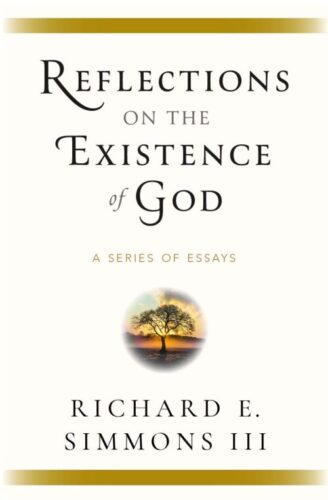Reflections on the Existence of God: A Series of Essays, by Richard E. Simmons III, is an excellent resource for small group study, to facilitate spiritual conversations with non-believers or, as in my case, to engage with a middle-schooler. I have a precocious granddaughter who is in the sixth grade but reads and reasons at the high school level. Recently she informed her mother that she no longer believed in God. As I spoke with her, it became apparent to me that she had not based her position on diligent study. Instead, hers might have been what the author called “irresponsible unbelief.” (Maybe. But I suspect she was just being contrary to irritate her mother because that is what kids her age do.)
The author asserts, “The question of God’s existence, in my opinion, is the most significant issue in all of life. As renowned French philosopher and mathematician Blaise Pascal said, you’re betting your eternal destiny that you are right.” (pp. 12-13). The core of the author’s rationale is belief in either theism or atheism depends on which view is in harmony with reality. From that position, he challenges the reader to “believe responsibly.” According to him. “We stubbornly hold on to our beliefs because they generally reflect how we want life to be rather than how life actually is. For this reason, evidence does not seem to matter.” (p. 19).
While I am certain God exists, that he made us and loves us so much he was willing to die for us, I found this work helpful in synthesizing what I already knew about God while providing solid arguments against disbelief. Two of the most surprising bits of information about atheists I gleaned from my reading had to do with their thinking as they neared death and the fact they knew next to nothing about the faith they rejected throughout their lives. He concluded, “The evidence for God is really of little use if a person does not want Him in his or her life.” (p. 22)
The author logically addressed the existence of evil in the world, the source of a moral standard along with truth, love, happiness and beauty. He recounted the efforts of Einstein to discredit a transcendental source of morality and the irony that his General Relativity theory demonstrated the universe was not eternal. He proved it had a beginning. One is left to wonder if it extends back to a “Big Bang” who or what spoke that “Big Bang” into existence? Since Einstein’s theory might have pointed to a creator, he introduced a fudge factor, which was later discovered and discounted by other scientists.
According to Simmons, Darwinism is, likewise, proving to be “a philosophical bias more than a coherent science.” (p.174) Some scientists find it easier to introduce aliens into the creation process than to acknowledge the existence of God. The author points to Dr. Paul Vitz who concluded “atheists often develop their beliefs because of non-rational psychological reasons, not because of investigation of the evidence and coming to a sound rational conclusion.” (p. 114) I highly recommend this book for anyone interested in adding logic to your faith.
Reflections on the Existence of God: A Series of Essays, by Richard E. Simmons III (Union Hill Publishing, 2019)


Recent Comments